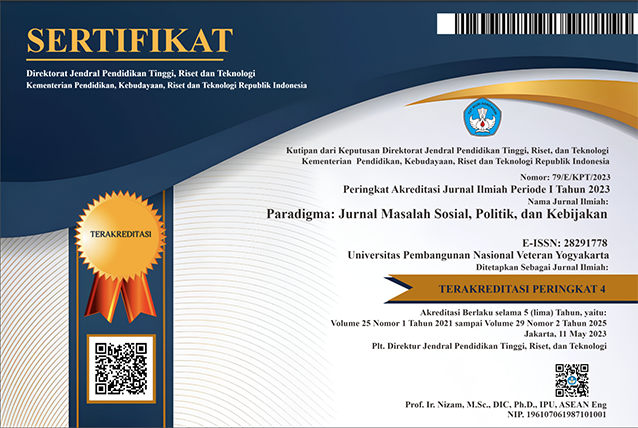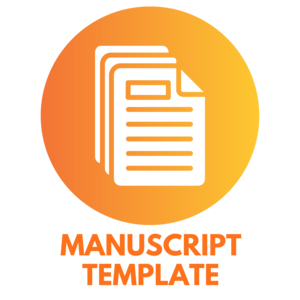IMPLEMENTASI KERJASAMA UN WOMEN DAN NCW DALAM MENINGKATKAN PARTISIPASI POLITIK PEREMPUAN DI MESIR (2017-2022)
DOI:
https://doi.org/10.31315/paradigma.v27i2.10217Keywords:
Partisipasi politik, Organisasi Internasional, PatriarkiAbstract
Mesir merupakan salah satu negara kawasan dunia Arab yang masih menganut tradisi patriarki. Mesir telah mengambil beberapa langkah dalam beberapa tahun terakhir untuk mengadaptasi dan mereformasi kerangka hukum dan kebijakannya untuk mendukung partisipasi politik perempuan. Mesir telah mendirikan berbagai institusi sesuai dengan Pasal 214 UUD 2014 salah satunya adalah National Council for Women (NCW). NCW didirikan pada tahun 2000 untuk mengkonsolidasikan semua upaya nasional mengenai kesetaraan gender dan pemberdayaan perempuan. Rendahnya partisipasi politik perempuan di Mesir kemudian menarik perhatian Organisasi Internasional yaitu UN Women untuk turut membantu NCW dalam meningkatkan partisipasi politik perempuan. UN Women merupakan organisasi PBB yang didedikasikan untuk kesetaraan gender dan pemberdayaan perempuan. Kerja sama kedua organisasi tersebut bertujuan untuk meningkatkan peran perempuan dalam ruang publik, khususnya partisipasi politik perempuan di Mesir.
References
Artikel Jurnal
About UN Women. (n.d.). Retrieved from UN Women: https://www.unwomen.org/en/about-us/about-un-women
AUEOM. (2016). Final Report: 2015 Parliamentary Elections in the Arab Republic of Egypt. African Union Election Observation Mission.
El-Rashidi, S. (2014, April 24). Egyptian women campaign for larger role in parliament. Retrieved from Al-Monitor: https://www.al-monitor.com/originals/2014/04/egypt-women-dostour-parliament-rights.html#;
Garcia, L., & Ziada, D. (2012, January 19). In Egypt's New Parliament, Women Will Be Scarce. Retrieved October 12, 2022, from NPR: https://www.npr.org/2012/01/19/145468365/in-egypts-new-parliament-women-will-be-scarce
International IDEA. (2013). Political Parties in Africa through a Gender Lens. Retrieved from https://www.idea.int/sites/default/files/publications/ political-parties-in-africa-through-a-gender-lens.pdf
Jamilah, Maryam. (2017). Ketidaksetaraan Gender Perempuan Mesir di Bidang Politik Pasca Arab
Spring 2011. Buana Gender.
Jayachandran, S. (2015, Agustus). The Roots of Gender Inequality in Developing Countries. 74-84.
Khodair, A. A. (2015). Women’s Political Participation in Egypt: the Role of the National Council for Women. Academic Research Journals.
Markham, S. (2013). Women as Agents of Change: Having Voice in Society and Influencing Policy. Women's Voice, Agency, and Participation Research Series, No. 5.
Mazen Hassan, P. (2018). Women in the Egyptian Parliament: A Different Agenda? ISSUE BRIEF.
Nurcahyo. A. (2016). Relevansi budaya patriaki dengan
partisipasi politik dan keterwakilan perempuan di parlemen. Jurnal Agastya.
Sahid. (2011). Memahami Sosiologi Politik. Gahalia indonesia .
Sanyal, P. (2016). Parlementary Election in Egypt 2015. Contemporary Review of The Middle East.
Sastroatmodjo, S. (1995). Perilaku Politik. Semarang: IKIP Semarang Press.
Surbakti, R. (1999). Memahami Ilmu Politik. Jakarta: Pt. Grasindo.
Suryadi, B. (2007). iSosiologi Politik Sejarah, Definisi danP erkembangan Konsep. Yogyakarta.
UN Women. (n.d.). Retrieved from About UN Women: https://www.unwomen.org/en/about-us/about-un-women
UN Women. (2018). Achievments Report 2018. UN Women.
Women, U. (n.d.). About UN Women. Retrieved from https://www.unwomen.org/en/about-us/about-un-women
World Economic Forum. (2015). The Global Gender Gap Report (2015). Retrieved from The Global Gender Gap Report 2015.
Zeid, G. A. (2006). The Arab Region: Women’s access to the decision-making process across the Arab nation. Routledge.
Downloads
Published
How to Cite
Issue
Section
License
The manuscript submitted to Paradigma: Jurnal Masalah Sosial, Politik, dan Kebijakan journals are released under the license of Creative Commons Attribution-Non Commercial- ShareAlike (CC BY SA) if and when the article is accepted for publication.
We declare that:
- This paper has not been published in the same form elsewhere.
- It will not be submitted anywhere else for publication prior to acceptance/rejection by this Journal.
- A copyright permission is obtained for materials published elsewhere and which require this permission for reproduction.
Retained Rights/Terms and Conditions
Authors retain all proprietary rights to the published works, such as (but not limited to) the following rights:
- Copyright and other proprietary rights relating to the article, such as patent rights,
- The right to use the substance of the article in own future works, including lectures and books,
- The right to reproduce the article for own purposes,
- The right to self-archive the article
The right to enter into separate, additional contractual arrangements for the non-exclusive distribution of the article's published version (e.g., post it to an institutional repository or publish it in a book), with an acknowledgment of its initial publication in this journal Paradigma: Jurnal Masalah Sosial, Politik, dan Kebijakan



